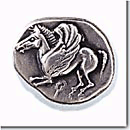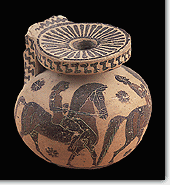


  | |
|
Power at Corinth was exercised, from the mid-8th to the mid-7th century B.C., by the family of the Bacchiadae, which numbered some two hundred male members. In the context of the family, endogamy had been imposed, and every year one of its members was designated basileus or prytanis. Even if the estate of the Bacchiadae was based on ownership in land, they favoured the founding of colonies. Corinth was mother-city to Ambracia and Corcyra, while Bacchiadas was also the founder of Syracuse. At the end of the 7th century she took advantage of her strategic position to already become one of the most important naval powers in the Hellenic world. |
Cypselus - a Bacchiad on his mother Labda's side - seized power by going into partnership with the demos, after taking office as polemarch. Some historians link this constitution upset to the agricultural crisis that also served as a catalyst to developments in other cities as well. For as long as he was polemarch he never imposed a fine, or put anybody in prison, or allowed people who could not meet their debts to be sold into slavery. When he actually became tyrant, he confiscated the lands of the Bacchiadae and distributed them to the landless. He also laid down that a tithe of all produce should be dedicated at the temple of Zeus. He is further credited with minting the first Corinthian coinage (stater). At all events, it was perhaps the goodwill of the demos that justified his remainign in power for thirty years. Certainly Aristotle mentions, as an example of his popularity, the fact that he did not have a personal bodyguard. |  |
 |
He was succeeded by his son Periander in about 527 B.C. In contrast to his father, Periander was notorious for the harshness of the measures which he took in order to remain in power. He had a personal bodyguard of three hundred doryphoroi (spear-bearers), and did not scruple to execute any whom he thought dangerous. He forbade the acquisition of slaves and excessive display of wealth, since these emphasized the superiority of the aristocrats. He developed 'special relationships' with the cities of Ionia and the kingdom of Lydia. Corinth founded new colonies (Epidamnus, Apollonia and Potidaea, for example), and exported her craft products, a typical one being her pottery, throughout the Mediterranean. It was at this time that the Isthmian Games, one of the four principal athletics events in Hellas, was established. The tyranny was overthrown at the time when Periander's successor Psammetichus took power: this did not however revert to the keeping of the nobles, but was passed to the most well-to-do citizens. |
|
| |
|
Note: Click on pictures to see a short description. | |